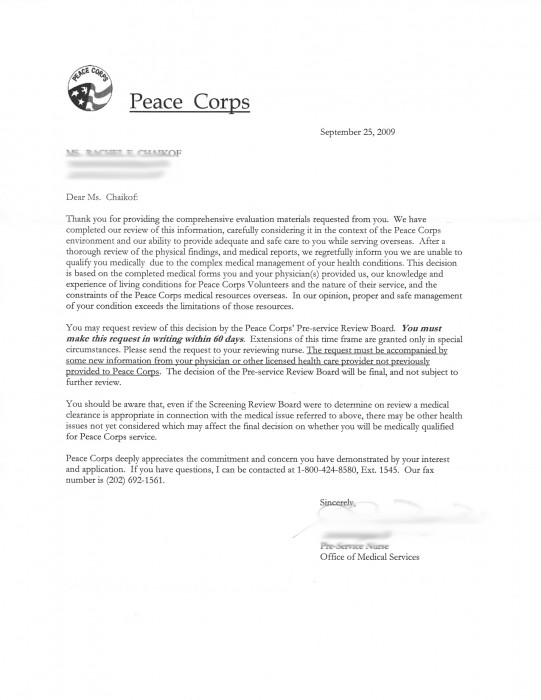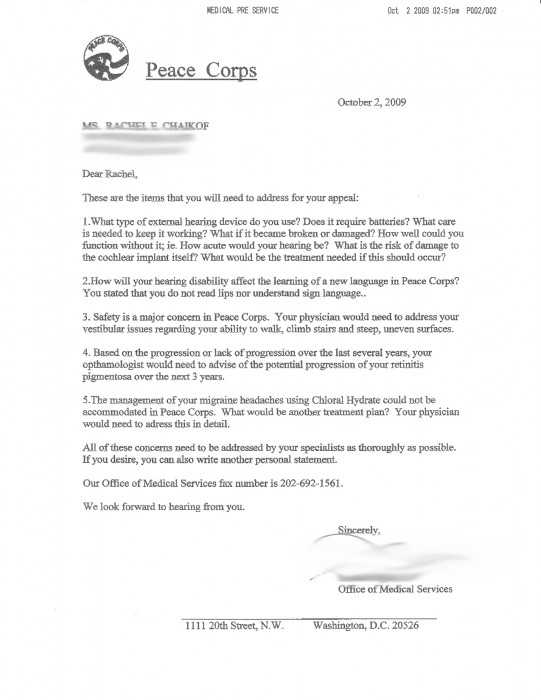October 2nd, 2016 by Rachel | Tags: Peace Corps | 1 Comment »
“It always seems impossible until it’s done.”
“A winner is a dreamer who never gives up.” – Nelson Mandela
As I reflect on my two years of Peace Corps service in Cameroon, I think back to the very moment that happened exactly seven years ago, in September 2009. I was a very young adult who was a senior in college and had such a big hunger to see and change the world. I applied to join the Peace Corps but then I was denied solely based on my disabilities. I want to share my rejection letters which I happened to save, because they symbolize so many things. The decision made by one person in the medical office was wrong. The decision was so clearly wrong.
(Click on the letters to view them in larger size)
A person who seemingly had so many complex medical conditions and disabilities on paper is about to successfully finish her two years of service in a country with very challenging living conditions.
The letters do, however, also represent a blessing in a disguise. Because of these letters, I contacted Mobility International USA (MIUSA) when I was reapplying to join the Peace Corps three years ago, in 2013, looking for support and advice on reapplying as a person with disabilities. I contacted them simply because I wanted to make sure I would not be rejected again. When I received an invitation to serve in Cameroon and I contacted MIUSA again to inform them that I had been invited and thanked them for their support, they connected me to a person with disability living in Cameroon. This person with disability then became my official Peace Corps counterpart, Ruth Acheinegeh. My work assignment, working with persons with disability by providing them greater access to health education, happened only because of this very rejection letter. It was the best work assignment I could have received. I have never worked with anyone who is more motivated than the work partners with whom I established a great rapport.
More importantly, these letters forced me to wait for something so special. If I had not waited for an additional five years to serve, I would not have met the love of my life, Alex, with whom I plan to live indefinitely when we return to the US. We created so many memories together in the past two years that we will treasure for many years to come. Meeting Alex happened because of these letters.
I am so eternally grateful that I made the decision not to give up and try again. Choosing to reapply to join the Peace Corps was obviously the best decision. As I look back on my two years of service, pulling that door open that was once shut to me has clearly brought so many wonderful gifts.
I can live no longer regretting that I didn’t fight for my right to serve as a person with disability and that I never had the opportunity to live my dreams. While I can live no longer holding a grudge for these very letters, my story teaches real lessons.
No matter how complex the disabilities may appear on paper, they do not define a person’s life. They do not equate to obstacles and prevention from doing work successfully and living safely. A Peace Corps Medical Officer said to me during my service, “I didn’t know about Usher Syndrome until I looked at your medical files. I looked it up and learned about it. Thank you for teaching me about it. I now know that when I review applicants, a person like you who has complex conditions can serve successfully.”
Living in Cameroon with cochlear implants posed no obstacles. The hearing devices were so durable that they lasted throughout the two years after having been beaten up by dust and downpouring rain. I was still able to get my hearing tuned up through the internet, working with an audiologist 6,000 miles across the Atlantic Ocean in the US thanks to the innovation of remote MAPping, also known as telepractice. I passed the French exam on my second day in Cameroon, which meant that, unlike the majority of volunteers in my training group, I did not need to take any additional exams to prove my competency in French. Even though I passed the exam on my first try, I still took French classes to continue to improve my language skills. This meant that my hearing disability did not in any way pose any barriers to learning a language. Vestibular issues – Well, I climbed up to the top of Mt. Ngaoundere one month after I arrived in Cameroon. I think that pretty much says if this girl can climb a mountain, then vestibular issues are really nothing. Even though I can’t walk on a balance beam, the world is not full of balance beams. Regarding losing my vision – Legally blind people have successfully served in the Peace Corps, including one woman who served from 2006 to 2008 in Extreme North, Cameroon. If a woman who is legally blind like her can serve, then there is no reason why a person who is slowly going blind can’t serve too. Finally, as for migraines, this medical condition is so common that there is a wide variety of medication options and, in my situation, I get them very rarely, and they’re easily treated with various types of medications. The bottom line is that no matter how complex the medical conditions may appear on paper, persons with disabilities find ways to tear down the walls by finding alternative ways to function in their own bodies.
I want the general population to know that they should not underestimate the abilities of persons with disabilities. I also want to teach them that disability should not be an excuse to say “no” to an activity one wishes to do, especially when it comes to traveling and living abroad, including in the most difficult conditions.
I also want persons with disabilities to know that they should not underestimate their own abilities too. They should be able to realize they can push themselves against their own barriers. I want them to be able to use my story as a case study. If they apply to join the Peace Corps and face obstacles in getting accepted because of their own disabilities, I want them to take my story and say, “If she was able to serve successfully, I can do it too.”
When children with disabilities tell their parents that they dream of serving in the Peace Corps or even simply traveling and living abroad and their parents say “no” because they fear that their disabilities can hinder their ability to do the work successfully and live safely, I want these children with disabilities to be able to take my story and show it to them and say, “You can’t say ‘no’ because if this person who is deaf and going blind was able to do it, I can do it too.”
For all people, both with and without disabilities, we should know that if we face a rejection, we should not allow that roadblock to stand in our way. Being persistent and trying again are the best two actions we can take to achieve what we desire to do. It’s so easy to say, “I don’t think it’s worth the time to try again because I’ll probably fail again.” We should instead say, “I am going to try again because I’ll probably succeed this time around.” If we don’t try again, there is always a chance that we could be missing out on reaching our dreams.
I want my story to serve as a weapon for persons with disabilities to fight for their right to achieve the dreams they wish to dare.
When I return to the US, I hope to share my story with as many people as I can so that we can open up more doors that have been shut to persons with disabilities.
Also — I would like to thank whoever was in the medical office in 2013 and 2014, reviewed my application and decided to give me the chance to serve in the Peace Corps. You obviously made the very right decision, and I am very thankful.




1 Comment
Tara Menendez
October 2, 2016 at 1:21 pm
Beautifully written, empowering, and a lesson in deed! I was at first rejected by PC too. Because my history includes childhood sexual abuse and the fact that I was also in counseling, a medical officer told me that I would need to “complete counseling first” so that I would not “relapse”- I never knew that I “lapsed” in the first place! I fought it and won. I think the key here is persistence! Where there is a will, there is ALWAYS a way! Your post is incredibly inspiring. Thank you so much for being you. The world needs you. I can’t wait to see what you do next!